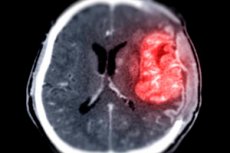New biological mechanism discovered for treating breast cancer metastases to the brain
Sist anmeldt: 14.06.2024

Alt iLive-innhold blir gjennomgått med medisin eller faktisk kontrollert for å sikre så mye faktuell nøyaktighet som mulig.
Vi har strenge retningslinjer for innkjøp og kun kobling til anerkjente medieområder, akademiske forskningsinstitusjoner og, når det er mulig, medisinsk peer-evaluerte studier. Merk at tallene i parenteser ([1], [2], etc.) er klikkbare koblinger til disse studiene.
Hvis du føler at noe av innholdet vårt er unøyaktig, utdatert eller ellers tvilsomt, velg det og trykk Ctrl + Enter.

Researchers at the University of Arizona Cancer Center (UArizona Health Sciences) have identified a biological mechanism that could lead to more effective treatments for breast cancer that has metastasized to the brain.
By studying the metabolic differences between primary breast cancer cells and cells metastasizing to the brain, the scientists determined that autophagy was significantly activated in brain metastases. Autophagy is a cellular recycling process that cancer cells use to survive stressful conditions, such as those caused by anticancer drugs.
"The prognosis for patients with brain metastases from breast cancer is extremely poor, and treating such metastases remains challenging. We were able to disrupt the ability of cancer cells to form brain metastases by disrupting the autophagy pathway," said Dr. Jennifer Carew, senior author of the study. p>
In a study published in Clinical and Translational Medicine, researchers showed that targeting a key autophagy-regulating gene, ATG7, significantly reduced the ability of breast cancer cells to form brain metastases in mouse models.
Researchers examined whether hydroxychloroquine, which is approved by the Food and Drug Administration (FDA), could be used to treat brain metastases from breast cancer. Hydroxychloroquine inhibits autophagy later in the pathway and, importantly, readily crosses the blood-brain barrier.
The team of researchers combined hydroxychloroquine with lapatinib, also approved by the FDA for the treatment of breast cancer. This combination has been shown to successfully reduce the number and size of breast cancer brain metastases in mouse models. This is the first time that researchers have studied the effectiveness of hydroxychloroquine in combination with lapatinib for the treatment of breast cancer.
“Our team was amazed at how significantly we were able to reduce the ability of cancer cells to form brain metastases by targeting just one pathway,” said Dr. Carew. "Cancer cells have unfortunately evolved many ways that make it difficult to stop their growth or kill them. It's always a little surprising to see how changing just one aspect can affect the outcome."
Dr. Steffan Nawrocki, first author of the study, said: "Because hydroxychloroquine and lapatinib are already approved by the FDA, we can quickly move to clinical trials of this combination for patients with brain metastases from breast cancer."
Brain metastases are the most common central nervous system tumors in adults, with 20%–30% of cases occurring in patients with breast cancer, especially those with triple-negative disease or HER2 amplification. Managing breast cancer brain metastases is challenging, and only 20% of patients with brain metastases survive more than five years.
This study opens new horizons in the treatment of metastatic breast cancer and may significantly improve the prognosis for patients with this serious disease.
